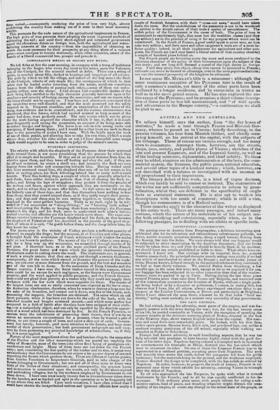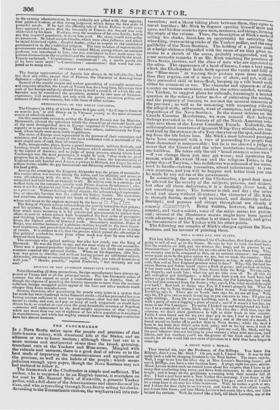AUSTRIA AND THE AUSTRIANS.
To relieve himself, says the author, from " the dry bones of statistics," he made a tour through France and Rheoish Ger- many, whence be passed on to Vienna; briefly describing, its the present volumes, his tour from Munich thither, and chiefly occu-
ing himself, on his arrival at the capital, with the subjects of his titlepage. These of course are various enough, and too many even to enumerate. Amongst them, however, are the streets, shops, inns, society, and public places of Vienna ; sketches of the late and present Emperors, and of the Imperial family, as well as of the leading ministers, diplomatists, and chief nobility. To these may be added, chapters on the administration of the laws, the com- mercial system, the finances, the public press, national education, and several other topics of a kindred nature ; which, however, are not described with a fulness or investigated with an acumen at all proportioned to their importance.
The literary defect of this work, is a kind of vague dryness, which can hardly be said to amuse or instruct. The statements of the writer are not sufficiently comprehensive to inform by gene- ralization, whilst they are deficient in the specificality of single facts or statistical statements. He is also apt to weaken his descriptions with too much of comment; which is still a vice,. though his commentary is of a Radical nature. These remarks apply to the character of the writer as displayed. in his entire work. There are many passages, and indeed many sections, which the stature of his materials or of his subject ren- der both satisfying and entertaining, especially when, as in the following passages, he is dealing with anecdotes or specific facts.
CONTINENTAL CUSTOMHOUSES.
On passing over to Austria from Bergtesgaden, a delicious interesting spot celebrated also for its salt-mines and extraordinary subterranean galleries, we drove, amidst romantic mountain scenery, along a rapid torrent, flowing from the Koenig-See into the Salm. We were always told that our baggage would be subjected to strict examination by the Austrian donaniers ; that our books would be taken from us ; and that we should be heavily fined, if, by accident, we should have any article prohibited or liable to duty. What others have ex- perienced, I know not. Our carriage with its imperial, boot, &e. entered Austria unsearched ; the principal douanier merely asking very civilly if we bad any article of merchandise to enter at the Douane ; and as to books, (some of them, Heaven knows, Liberal enough in the political substance they contained,), we had at least thirty volumes. We entered Baden from Strasburg, a few months ago, in the same free way ; and, except as far as we required it for uss, our baggage has been subjected to no other inspection than that of the washer- woman, since we packed it up in Paris. Having during the last three years entered Prussia more than once from France and Belgium, and traversed over all the intermediate countries to the frontiers of Russia, without a single pack- age being looked at by a douanier or policeman, I cannot, in stating this, but observe that I have, like all others, always experienced vexatious delay to no purpose at the London Customhouse, at Dover, and particularly at Brighton a where I have observed the man there, whoever Ile be that holds "brief au- thority," acting most uselessly, in a manner very unworthy of any government.
THE LATE EMPEROR.
He had visited, during his adversity, most parts of the empire, and was fre- quently present with the army during the war; but, for the last twenty years of his life, he resided constantly at Vienna, with the exception of spending the summer months at the delicious watering-place of Baden, situated at the foot of the Rhaetian Alps, about sixteen English miles from the capital. His man- ners and usual dress were remai kably plain. He looked, with his thin face, rather spare person, Ilesaian boots, black suit, and powdered hair, not unlike a. studious country gentleman of the old school, especially while walking un- attended at Baden or Schoubrun.
Francis had known adversity in such humiliating aspects, that he was too fully schooled into prudence to have become highly elated with the good for- tune of his latter days. Napoleon having ordered a triumphal arch to be erected to commemorate his triumphs at Milan, directed alai tile bas-reliefs which were to ornament its sides. On one of these the Emperor Francis was to be represented in a subdued position, accepting peace from Napoleon. The arch had scarcely risen above the earth, before the conqueror tell from his giddy eminence; but the materials being on the ground, and the workmen employed, Francis directed the design to be completed, with the bas-reliefs as ordered by Napoleon. In order, however, to preserve the truth of history, Francis is re- presented near those which exhibit his adversity, entering Vienna in triumph after the defeat of Napoleon.
To all who approached the late Emperor, he spoke with what is termed bonhornmie by the French ; and to all he was equally unaffected in his de- meanour. With ordinary plain sense, with ample talents for ruling a sub- missive nation, fond of peace, and dreading whatever might disturb time tran- quillity of the empire, or create any change in the actual state of the people, or. in the exieting administration, he was evidently not gifted with that sagacity. that political wisdom, or that strong judgment, which forms the first.order of powerful robots. If he had, the affecting tale of Silvio Petite° would never have appeared, to prove that the humanity of Francis the Second was only obliterated by his fears. If others, even the members of his own family, had in any way acquired popularity, it drove him lead. He, alone, would monopolize its possession. He loved acceptedtruths. which were often fallacies, and which he styled historical rights ; dreaded doubts, either in respect to the established government or to the established religion. The very mention of representative governments terrified him. When he visited Milan, among others, an eminent professor was introduced to him, who was considered to have made some im- portant discoveries in the constitution of the atmosphere. Startled by the word. Francis exclaimed, " Constituzione! constituzione! ah, e quella parole elle ci ha fatto tanto male !"—Constitution ! constitution! that word has sub- jected us to many evils.
AtsTRIAN DIFLOMACY.
The foreign representation of Austria lias always, in its individu dity, had less than any other, except that of Prussia, the character of drawing-room diplomacy—diplomatic des salons.
Instead of the usually insipid and useless garnishing of untaught secretaries and exquisite attachr:s, the Court of Vieuna has, for a long time, taken care that each of her foteign embassies should form in itself a council, of which the ant- bawallor may be considered the president, assisted by two men of business- experience. well acquainted, not only with the power, resources, policy, and interests of their own country, but with those of other nations.
REMINISCENCES OF THE GREAT CONGRESS.
The Congress in 1814, of which Prince de Ligne said, "Le Cangte.s dame et ne marche pas," is still drawn on in Vienuese society as the most abundant
Source of anecdotic stock. * s *
On this memorable occasion, neither the Emperor Francis nor his Minister, Metternich, allowed the splendour which the assemblage of crowned heads and of the most distinguished men in Europe imparted to Vienna, to dazzle their sagacity or to pervert their views. There web e others, unfortunately for Eng- . land, whose heads were more liable to giddiness. The states of Europe were represented in the persons of their soveteigns and ministers, and in those of many of the most celebrated with a multitude of the most stupid men of rank front all countries. Balls, masquerades, plays, feasts, a grand tournament, military festivals, and Looting, would seem to have been the business which attracted this multitude to the capital of Austria; and to judge of many persons, among whom Lord Castlereagh was the most prominent, it might be said, "they made no good progress but in the dance." In the mazes of this drnce the representative of England not only banded over Java as a partner to Holland, but forgot his other solemn duties, amidst the gay fascinations and flattering attentions which made Lie head giddy.
Among the sovereigns, the Emperor Alexander was the prince of monarchs. Ills conveisation was sorcery among the ladies, and his affability and 'tempers were albsubduing with the men. His simplicity and his dislike to parade astonished and held forth an example to all. He seldom rode in a carriage, and walked daily on the ramparts, usually with Prince Eugime Beauharnois ; who, were it not for Alexander and Max-Joseph of Bavaria, would hay e been excluded as a parcesu. Without haling official dignity, the acknowledged representa- tive of chivalric heroism was the gallant Sir Sidney Smith. His narratives .end anecdotes absolutely turned the heads of ladies, old and younF ; many of whom still recur to the exploits narrated by the hero ui The King of Prussia seldom relaxed from the gravity natural to that prince; and his minister, Von Humboldt, proved, by the success of his diplomacy, how much more necessary it is fur princes and governments to intrust their affairs to amen to whom nature bath bequeathed the first order of perceptive and thinking intellects, than tei those who possess by accident, or the gift of kings, the highest orders of blazoned rank. Alexander's minister, Puzzo di forgo, was another instance of a plebeian exalting himself to the most impor• tent confidence, and proved that time and experiecce have enabled us to judge of results. It is evident to &I, that the powers which gained the advantage at this political sanhedrini, were those whose work was done by into who un- derstood their business.
The sovereign who gained nothing, but who lust much, was the King of Denmark. Ile was the third in age, and the most witty of the six monarchs. Theme was a general prejudice against him at first : his lively and agreeable manners removed this personal dislike. When, on his departure, after Nor- way was given to Sweden, and without having gained an additional subject, Alexander, intending to compliment him, said, " Sire, you take all hearts away with you." " Hearts, possibly," replied Frederick, " but certainly not one soul."
RESULTS OF THE AUSTRIAN PRoTECTIvE SYSTEM.
Notwithstanding all these precautions, foreign manufactures have always ap- peared at Vienna and at all the principal towns. The late Germanic union of customs has also caused so great a contraband trade in Austria, that, al- though the expense of guarding the frontier amounts to more than the revenue collected, foreign smuggled goods appear at the fairs and other markets much cheaper than home manufactures. Austria, therefore, after persevering for nearly sixty years in a system that Inn made her twice bankrupt in her financial credit—that has prevented her ever having resenue sufficient to meet her expenditure—that has left her without means to clothe, and arm, and pay an army of such magnitude as would have driven back, or crushed at once even the most formidable invasion of Napoleon —remains still embarrassed by the dead-weight oppression of that system ; while not more than one out of eighteen of ber whole population is employed in manufactories, and while her mighty natural elements for foreign commerce have lain almost dormant.



























 Previous page
Previous page